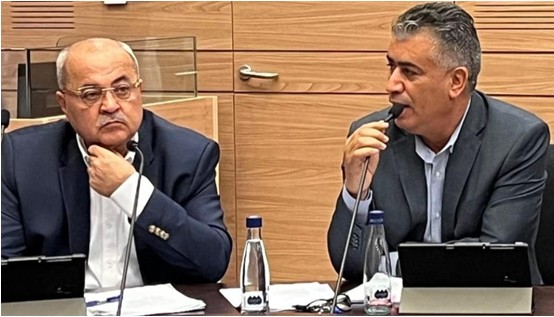The Finance Committee of the Knesset, chaired by MK Moshe Gafni (United Torah Judaism), convened on Monday, February 12, for a debate on the additional budget for 2024. The original 2024 budget, which passed in May 2023, became irrelevant due to an increase in government spending and a decrease in income in the wake of Israel’s war in Gaza and reinforcement of occupation in the West Bank. Israeli law required that the government bring a renewed budget and the renewed budget passed its first reading on the Knesset floor on Wednesday. The finance committee’s meeting kicked off a series of debates and then voting ahead of the budget’s return to final voting on the Knesset.

Hadash-Ta’al MKs Ahmad Tibi and Youssef Atawneh during a meeting of the Finance Committee of the Knesset (Photo: Al-Ittihad)
During last days, Hadash-Ta’al lawmakers slam the government’s amended 2024 budget. According to MK Ofer Cassif, during a debate held at the Knesset Plenum, “The far-right government continue to transfer billions in coalition funds, to the criminal war in Gaza and to reinforce occupation and settlements in the occupied Palestinian territories,” He exposed the major cuts and the growing economic difficulties for the working families, their capacity to earn a decent living, and their capacity to receive quality social services for health, welfare and wellbeing needs that have been significantly exacerbated directly and indirectly due to the war in Gaza and the occupation of the West Bank.
To pay for the defense spending increase of around NIS 70 billion ($18.6 billion), the budget includes an across-the-board cut of 3 percent from all government ministries with some exceptions like the army and security forces. It also slashes around NIS 2.5 billion ($670 million) out of NIS 8 billion in coalition funds — discretionary funds earmarked for pet projects of MKs and ministers, and contains a deficit target of 6.6% of GDP. The current plan does not contain any provisions for reducing the number of government ministries, despite the Finance Ministry’s recommendation that 10 superfluous ministries — including the Settlements and National Missions Ministry, the Jerusalem and Jewish Tradition Ministry, and the Intelligence Ministry — be closed to cover the wartime shortfall.
In the Knesset Finance Committee meeting, MK Ahmad Tibi (Hadash-Ta’al) said: “Here we’re talking about a harmful decision that hurts many sectors and populations, and most of all the Arab population. The cutbacks are as follows: There’s an across-the-board cut in all government ministries, there is a 15% cut in government plans, the five-year plans. In the five-year plans for Arab society, which started in 2015 and continued, there is a cutback of NIS 32 billion, which is a cutback of 88% of the five-year plans, of the 15%. The third cutback is NIS 600 million from the balancing grants, until 2026. This means that there is a decision here that causes targeted harm, almost lethal harm, to Arab society. Employment in general and women’s employment in particular, infrastructure, the healthcare system in Arab society and healthcare in general, housing and education are being severely harmed.”
“I have seen reactions in civil society, people saying that the cutbacks are causing grave harm to Arab society and to growth mechanisms, I was also told that the Prime Minister made a similar comment in the Government meeting on the topic, but there was still a terrible cutback. The decision on the balancing grants is crushing the municipalities in the Arab sector. The Minister of Finance said at first that it was because of crime in Arab society, but then he cuts NIS 300 million from the plan for combating crime in the Arab sector. Logically this doesn’t make sense, perhaps it is compatible with the minister’s worldview, but not with economy and not with the recommendation of the OECD, which stated that reduction of disparities in Arab and Haredi society is vital for Israel’s economy,” he said.
Related: https://maki.org.il/en/?p=31541


